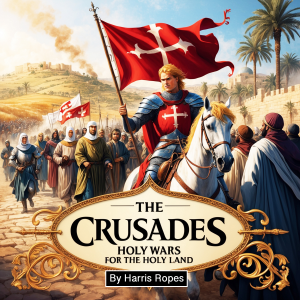

The Crusades
Harris Ropes
The origins of the Crusades lie in a complex blend of religious fervor, political ambition, and cultural conflict that took shape in the late 11th century. At the heart of the movement was a passionate desire by Christian Europe to reclaim the Holy Land—particularly Jerusalem—from Muslim control. For centuries, Jerusalem had held sacred meaning for Christians, Jews, and Muslims alike. However, by the late 11th century, it was under the rule of the Seljuk Turks, who had taken control of large parts of the eastern Mediterranean, including important Christian pilgrimage routes.
The political climate of Europe during this period also played a significant role. Feudalism was the dominant system, and many nobles were constantly embroiled in local power struggles. At the same time, the Church had become the most powerful institution in Europe. It was in this context that Pope Urban II made a historic call to action in 1095 at the Council of Clermont. Responding to an appeal from Byzantine Emperor Alexios I for military assistance against the Seljuks, the pope called on Western Christians to take up arms and march to the East. His speech stirred a wave of religious enthusiasm, as he promised absolution of sins and eternal salvation to those who joined the cause.
This call ignited a massive response. Men from all walks of life—knights, peasants, and even children—began preparing for what would become known as the First Crusade. For many, the Crusades were not only a spiritual mission but also a chance for adventure, wealth, and social mobility. The idea of fighting in the name of God merged with more worldly motives, creating a powerful and often contradictory force.
Duration - 1h 25m.
Author - Harris Ropes.
Narrator - Saskia Higgins.
Published Date - Wednesday, 29 January 2025.
Copyright - © 2025 Harris Ropes ©.
Location:
United States
Description:
The origins of the Crusades lie in a complex blend of religious fervor, political ambition, and cultural conflict that took shape in the late 11th century. At the heart of the movement was a passionate desire by Christian Europe to reclaim the Holy Land—particularly Jerusalem—from Muslim control. For centuries, Jerusalem had held sacred meaning for Christians, Jews, and Muslims alike. However, by the late 11th century, it was under the rule of the Seljuk Turks, who had taken control of large parts of the eastern Mediterranean, including important Christian pilgrimage routes. The political climate of Europe during this period also played a significant role. Feudalism was the dominant system, and many nobles were constantly embroiled in local power struggles. At the same time, the Church had become the most powerful institution in Europe. It was in this context that Pope Urban II made a historic call to action in 1095 at the Council of Clermont. Responding to an appeal from Byzantine Emperor Alexios I for military assistance against the Seljuks, the pope called on Western Christians to take up arms and march to the East. His speech stirred a wave of religious enthusiasm, as he promised absolution of sins and eternal salvation to those who joined the cause. This call ignited a massive response. Men from all walks of life—knights, peasants, and even children—began preparing for what would become known as the First Crusade. For many, the Crusades were not only a spiritual mission but also a chance for adventure, wealth, and social mobility. The idea of fighting in the name of God merged with more worldly motives, creating a powerful and often contradictory force. Duration - 1h 25m. Author - Harris Ropes. Narrator - Saskia Higgins. Published Date - Wednesday, 29 January 2025. Copyright - © 2025 Harris Ropes ©.
Language:
English
Opening Credits
Duration:00:00:05
1 the crusades
Duration:00:11:43
2 the crusades
Duration:00:11:49
3 the crusades
Duration:00:11:53
5 the crusades
Duration:00:12:19
6 the crusades
Duration:00:12:14
7 the crusades
Duration:00:12:54
8 the crusades
Duration:00:12:40
Ending Credits
Duration:00:00:07